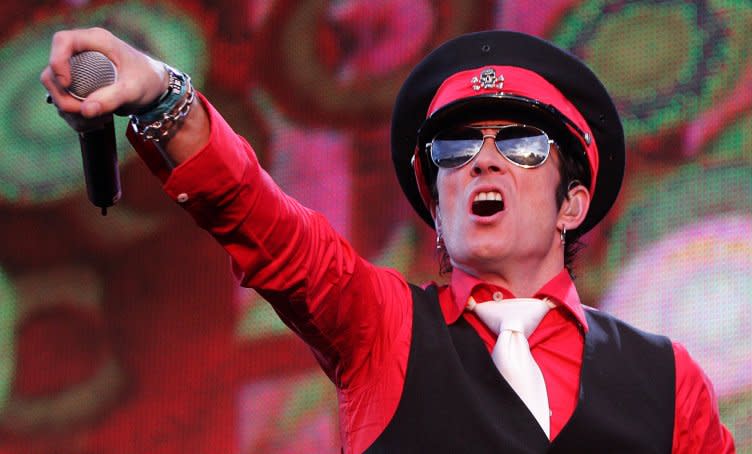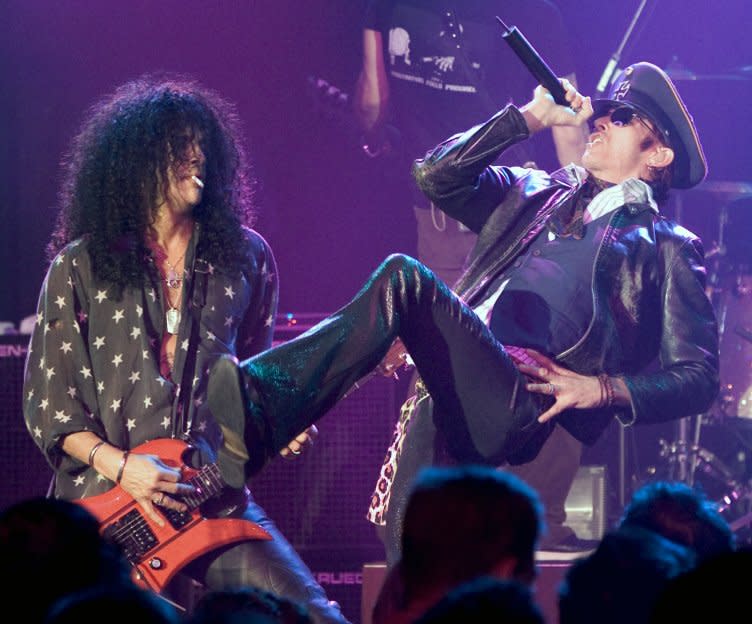Scott Weiland in Newsweek: Our 2004 Velvet Revolver Profile

U.S. rock star Scott Weiland of the band Velvet Revolver performs at the Live 8 concert in Hyde Park in London in 2005.Stephen Hird/Reuters
Singer Scott Weiland, best known as the frontman of Stone Temple Pilots and Velvet Revolver, died Thursday at the age of 48. Newsweek interviewed Weiland in 2004, just before he released his first album with rock supergroup Velvet Revolver. The rocker railed against the press, saying he was "tired of journalists acting like sycophants," and described his STP glory days as like being "caught up like a whirling dervish." Read the full profile below.
Train Wreck? Car Crash? Trailer Park in a Tornado? Any of these would have been a more appropriate name than Velvet Revolver. This supergroup, comprising some of rock's most notorious bad boys—Slash, Duff McKagan and Matt Sorum of Guns N' Roses, singer Scott Weiland of Stone Temple Pilots—spent the past year working hard on an album that everyone just knew would never happen. After all, Weiland had been busted on drug charges three times in the past decade, traded punches with STP bandmates onstage during their final tour and was in and out of rehab during the recording of Velvet Revolver's debut, Contraband. Slash, McKagan and Sorum had also been in and out of rehab, and they hadn't played together since their band imploded and Slash left in 1996. But against all odds, Contraband is out this week, and the first single, "Slither," is already in the top five on the rock charts, and the album is even being embraced—rather than eviscerated, as expected—by critics. The band is now finishing a club tour whose every date sold out in minutes—and that was before anybody had even heard the album. "I call it the Evel Knievel factor," says Weiland, 35, backstage before their New York show. "He filled stadiums, but not because people wanted to see him make the jump. They wanted to see if he'd crash and burn."
So far nobody's running for the fire extinguisher. But this unlikely combination of two rock superpowers—Guns N' Roses ruled the late '80s, and alternative rockers STP dominated the mid-'90s—is truly explosive. Guitar hero Slash lays down a base of blues-inspired arena rock, while Weiland's androgynous weirdness adds a touch of obligatory artiness. The result is a hard-driving album that sounds nothing like either of the original bands—or anything else on the radio these days. "I've been holding on for dear life to my original concept for a good rock-and-roll band," says Slash, 40, who decided to pull the group together after playing a successful 2002 benefit for an ailing friend with his former GNR bandmates. (They roped in Weiland after STP officially hit the skids a year and a half ago.) "I've never conformed to any other industry standard. God, can you imagine if I cut all my hair off and started a boy band? It would be very embarrassing."
It's still difficult to see Velvet Revolver (which also includes guitarist Dave Kushner, from Dave Navarro's band) as a cohesive group. Behind the scenes, Slash and Weiland don't have much interaction. They do interviews separately, and during sound checks they hardly look at each other. You get a sense that everyone is still testing the waters before they submerge themselves entirely. Still, Weiland claims there are no ego wars to speak of, and Slash says he finds the STP singer a joy to work with after dealing with one of rock's most mercurial frontmen, Axl Rose. "Scott always wants to work," says Slash, "and that's a change. With Axl, it was impossible to get him to do anything. Scott's whole problem is tangible—it's just a drug problem. It's not something completely insane that we can't understand."

Velvet Revolver guitarist Slash (left) and singer Scott Weiland perform during the first of two consecutive sold-out shows at the Joint inside the Hard Rock Hotel & Casino in Las Vegas on December 31, 2004.Ethan Miller EM/SH/Reuters
Weiland is sober, but he still appears painfully skinny and smokes too much. He's visibly uncomfortable doing interviews again, and looks genuinely happy only when talking about his two small kids and his wife of four years. He's spoken to only a few journalists since Velvet Revolver launched and says this will be his last interview for a while. "I'm tired of being asked the same questions regarding drugs, arrests, what it's like to be in the back of a cop car," he says. "I'm also tired of journalists acting like sycophants, then, when they get away to a safe distance, printing what they think I should have said. Call me a fuckup, fine, but say it to my face before you make it a headline. If I meet them again I'll shake their hand and smack them in the face." Slash, on the other hand, seems to relish the attention. He looks exactly as he did back in the day, and he's recognized by cops and kids alike when he enters the building for a sound check. He looks forward to hitting the stage, if only because "every time we do, it's a big 'fuck you' to everyone who said we'd never, ever make it there."
Velvet Revolver probably won't sell 7 million debut albums like STP, or become as legendary as GNR. Those are impossible standards to meet. But Weiland just wants to enjoy the ride—wherever it takes him. "With STP, it happened so fast I was caught up like a whirling dervish," he says. "By the time I landed on the ground, three years had gone by. Then 10 years. With Revolver, we've all shared the same narcotic misadventures, and now we have an opportunity to do things different. If this band has any success, we'll be able to enjoy it this time around." Rock-deprived music fans are enjoying the ride already.
This story originally appeared in the June 14, 2004, issue of Newsweek with the headline "The Little Band That Could."
Related Articles

 Yahoo News
Yahoo News 

